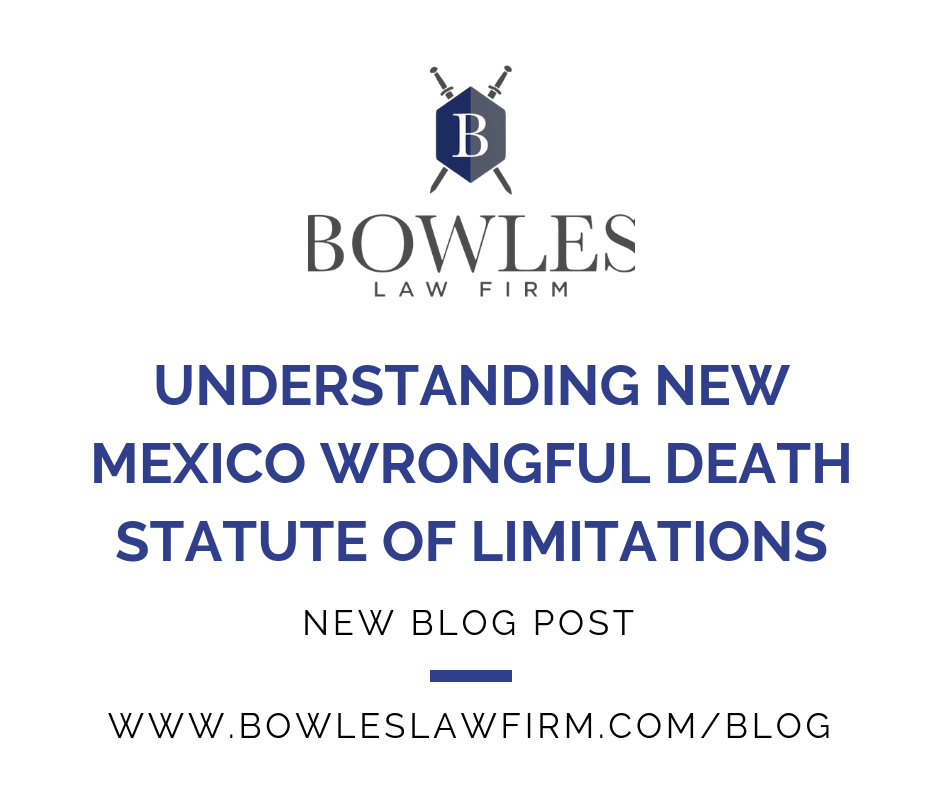
Understanding New Mexico Wrongful Death Statute of Limitations
Understanding New Mexico Wrongful Death Statute of Limitations
The filing of a wrongful death claim involves a lot of preparation and care. If you’re filing one in the state of New Mexico, statute knowledge is critical. Continue reading this blog post to learn more about New Mexico wrongful death statute of limitations.
Wrongful Death Claims in New Mexico
If you believe that another person’s actions brought on the death of someone close to you, then you may want to consider filing a wrongful death claim as soon as possible. Make sure to review New Mexico wrongful death statutes of limitations carefully before you file.
Understand What a Wrongful Death Is
It’s critical to understand exactly how the state of New Mexico classifies wrongful deaths. The state officially considers wrongful deaths to be those that are brought on by default, neglect or wrongful actions initiated by an individual or entity. Wrongful death cases are comparable to personal injury ones. The main difference is that the person who was wronged is not available to take action. Another party has to assume this responsibility instead.
Take Time Into Consideration
Make sure that you’re filing your wrongful death claim inside of the appropriate time frame. You have to file the case within a span of three years after the death date. If the individual passed away more than three years ago, then you’re likely unable to proceed with the claim.
Figure Out Whether or Not You’re the Right Person for the Claim
It’s important to figure out if you’re the right person to make the claim. Are you the designated representative of the victim’s personal estate? If you are, then you’re most likely good to go. It’s vital to assess the estate plan of the individual named in the wrongful death claim. Your name may be on display in the plan. Personal representatives generally are spouses who are still alive, or they often are siblings who are adults. Designated personal representatives sometimes do not have the ability to carry out their duties for whatever reason. Courts usually select personal representatives in these situations.
Request Information From Bowles Law Firm Today
Are you looking for a wrongful death attorney in New Mexico you can believe in? When you need a medical malpractice attorney in Albuquerque, the Bowles Law Firm can help. At this practice, you’ll find a criminal defense attorney in Albuquerque who can offer you assistance. You can consult with a personal injury attorney in Albuquerque, too. Contact our practice today for information about our various services in Albuquerque, New Mexico and Plano, Texas. CONTACT US HERE
Read More
What exactly is a wrongful death suit?
What is a wrongful death suit?
If someone dies due to carelessness and misconduct of another, the victims surviving family members may file a wrongful death suit. This suit is a personal injury claim that the deceased person is no longer able to bring him or herself rather; the survivors of the departed must bring the claim to court, to establish liability and to seek damages.
Wrongful death claims in New Mexico fall under personal injury law and will proceed in a similar way in terms of the legal process, rules, deadlines and law.
The disparity lies majorly in the losses or damages. The damages in a wrongful death claim can be immense due to the loss of life and trauma the death of a loved one brings. Although damages are the main variant, there are a few special rules under the New Mexico Wrongful Death Act that must be rigorously followed in filing a lawsuit. Nonetheless, it is wise to consult a lawyer experienced in New Mexico wrongful death law to pursue a claim.
under the New Mexico Wrongful Death Act that must be rigorously followed in filing a lawsuit. Nonetheless, it is wise to consult a lawyer experienced in New Mexico wrongful death law to pursue a claim.
Who May File a Wrongful Death Case in New Mexico?
A wrongful death claim must be litigated by the personal representative of the deceased in New Mexico. In most cases, the personal representative may be the surviving wife/husband or adult siblings. If these persons cannot or will not serve as the personal representative, the court will appoint a personal representative on a motion. Any damages given as a result of the claim are held by the estate of the deceased for the benefit of surviving family members:
With reference to New Mexico right of representation laws, if the spouse of the deceased is without children, all damages go to the spouse. If there is no spouse but their children or grandchildren are alive, the damages are shared among the children or grandchildren. In cases where the deceased has no spouse or children or the children are underage, the childs parents receive the damages. If there are no surviving parents, damages go to the deceased siblings.
Wrongful Death Claims-statutes of limitation
New Mexico bylaws section 41-2-2 specifies that a wrongful death suit must be filed within three years of the deceased‘s death. it is advisable to consult a lawyer to determine precisely how the statute of limitations will affect the case.
Damages in New Mexico for wrongful death cases
The types of damages accessible to certain individuals depends on their connection to the deceased person. Damages generally available in a New Mexico wrongful death claim include:
- Funeral and burial expenses.
- Medical cost of the deceased last illness or injury.
- Mental distress caused by the death of a parent, child, or spouse.
- Financial donations to the household by the deceased.
- Loss of inheritance, pain suffered by the deceased before death.
In some New Mexico wrongful death claims, punitive damages are available. Punitive damages are different from common damages because they do not indemnify the family for its losses. Alternatively, punitive damages are awarded to punish particularly atrocious actions, such as intentional harm, reckless conduct or gross negligence.
Because of all of these factors, it is wise to consult lawyers experienced in wrongful death cases prior to proceeding with a claim. Bowles Law Firm is available to talk with individuals who believe they may have a wrongful death claim. For a free case evaluation, click here.
Read More

How To Hire An Attorney In 4 Steps
It is important to make careful considerations when hiring an attorney to represent you. Read the top 4 tips below in order to make sure you hire the appropriate attorney for your unique situation.
1) Do I need a Lawyer?
First, ask yourself whether you need a lawyer and think through your problem and issues.
- Think about whether you can solve the problem on your own or if you truly need a lawyer. Sometimes, this will be easy. For example, if you are charged with a crime, you NEED a lawyer and sooner rather than later. Other problems won’t be so immediate, however.
- Numerous lawyers provide free consultations on initial visits, so take advantage of that consultation to further define the problem(s) and determine if you need a lawyer.

2) Finding the Right Lawyer for You
Not every lawyer is going to be a good fit for you, and you won’t be a good fit for every lawyer.
- Ask your friends and family for referrals for a lawyer who is reputable.
- Research online, including google searches and review the lawyer’s website to determine what his/her experience level is and get a feel for the lawyer’s background.
- Consider interviewing 2-3 lawyers before you make your decision, to decide who seems like the best “fit” for you, will be most committed to your case, is competent, and will have the time to help you.
3) Hiring a Lawyer
Relying on referrals and your own research, select a few lawyers who seem appropriate for your situation and conduct interviews.
- Before interviewing, ask the lawyer or staff whether you can have a free initial consultation.
- During the interview, get the lawyer’s thoughts on your situation, his/her experience and familiarity with the type of problem, and if you are potentially interested, ask for an engagement letter describing the scope of the lawyer’s services, and how costs and fees are determined.
- Make sure you have a clear understanding of the role of the attorney, and the fees and costs you will be charged is very important at the start of the relationship.
- Carefully review the engagement letter, and if you have questions, make sure you ask them and get a clear understanding of the terms of the representation.

4) During the Representation
Make sure you establish clear lines of communication with the lawyer and staff as well as what method of communication is best. Lawyers are sometimes in court, or out of town, and so you will need to communicate with staff members as well. If you have questions or problems, be proactive and make an appointment to speak about them
You are paying for the service and deserve to be kept apprised of developments in your case. You should make sure you invest time and effort into the lawyer/client relationship so that the lawyer and his/her office do a great job representing your interests.
